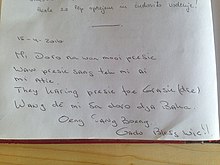Sranan Tongo
| Sranan | |
|---|---|
| Sranan Tongo | |
| Native to | Suriname |
Native speakers | (130,000 cited 1993)[1] L2 speakers: 50% of the population of Surinam (1993?)[2] |
English Creole
| |
| Language codes | |
| ISO 639-2 | srn |
| ISO 639-3 | srn |
| Glottolog | sran1240 |
| Linguasphere | 52-ABB-aw |
Sranan (also Sranan Tongo or Sranantongo "Surinamese tongue", Surinaams, Surinamese, Suriname Creole, Taki Taki) is a creole language spoken as a lingua franca by approximately 500,000 people in Suriname.[1]
Since the language is shared between the Dutch, Javanese, Hindustani, and Chinese-speaking communities, most Surinamese speak it as a lingua franca among both the Surinamese in Suriname, a former Dutch colony, and the immigrants of Surinamese origin in the Netherlands.
Origins

The Sranan words for 'to know' and 'small children' are sabi and pikin, which is due to the Portuguese having been the first explorers of the West African coast, where they developed a pidgin language from which a few words became common coin in interactions with Africans by explorers who came afterward, including the English. However, research has established that, as far as its lexicon is concerned, Sranan is mostly an English-based creole language, with a substantial overlay of words from Dutch, due to the Dutch takeover of Suriname in 1667.
Sranan Tongo's lexicon is thus a fusion of English, Dutch, Portuguese and Central and West African languages. It began as a pidgin spoken primarily by African slaves in Suriname who often did not have a common African language. Sranan also became the language of communication between the slaves and the slave-owners, as the slaves were not permitted to speak Dutch. As other ethnic groups were brought to Suriname as contract workers, Sranan became a lingua franca.
Although the formal Dutch-based educational system repressed its use, Sranan became more accepted by the establishment over time, especially during the 1980s when it was popularized by Suriname's then dictator Dési Bouterse who often delivered national speeches in Sranan.
Sranan remains widely used in Suriname and in large Dutch urban areas populated by immigrants from Suriname, especially in casual conversation where it is often mixed in freely with Dutch. People often greet each other using Sranan, saying for example "fa waka" (how are you) instead of the more formal Dutch "hoe gaat het" (how are you).
Sranan as a written language has existed since the late 19th century, and was given an official spelling by the government of Suriname on July 15, 1986 (resolution 4501). A small number of writers have used Sranan in their work, most notably the poet Henri Frans de Ziel ("Trefossa"), who also wrote Suriname's national anthem (the second verse is sung in Sranan Tongo).
See also
References
- ^ a b Sranan at Ethnologue (18th ed., 2015) (subscription required)
- ^ Sranan Tongo[dead link] at Ethnologue (14th ed., 2000).
Further reading
- Iwan Desiré Menke: Een grammatica van het Surinaams (Sranantongo), Munstergeleen : Menke, 1986, 1992 (Dutch book on grammar of Sranan Tongo)
- Jan Voorhoeve and Ursy M. Lichtveld: Creole Drum. An Anthology of Creole Literature in Suriname. New Haven: Yale University Press, 1975.
- C.F.A. Bruijning and J. Voorhoeve (editors): Encyclopedie van Suriname. Amsterdam: Uitgeverij Elsevier, 1977, pp. 573–574.
- Eithne B. Carlin and Jacques Arends (editors): Atlas of the Languages of Suriname. Leiden: KITLV Press, 2002.
- Michaël Ietswaart and Vinije Haabo: Sranantongo. Surinaams voor reizigers en thuisblijvers. Amsterdam: Mets & Schilt (several editions since 1999)
- J.C.M. Blanker and J. Dubbeldam: "Prisma Woordenboek Sranantongo". Utrecht: Uitgeverij Het Spectrum B.V., 2005, ISBN 90-274-1478-5, www.prismawoordenboeken.nl - A Sranantongo to Dutch and Dutch to Sranantongo dictionary.
- Henri J.M. Stephen: Sranan odo : adyersitori - spreekwoorden en gezegden uit Suriname. Amsterdam, Stephen, 2003, ISBN 90-800960-7-5 (collection of proverbs and expressions)
- Michiel van Kempen and Gerard Sonnemans: Een geschiedenis van de Surinaamse literatuur. Breda : De Geus, 2003, ISBN 90-445-0277-8 (Dutch history of Surinam literature)
External links
- Dictionaries
- Grammar
- Resources and more
- Begin to learn
- The New Testament in Sranan for iTunes
